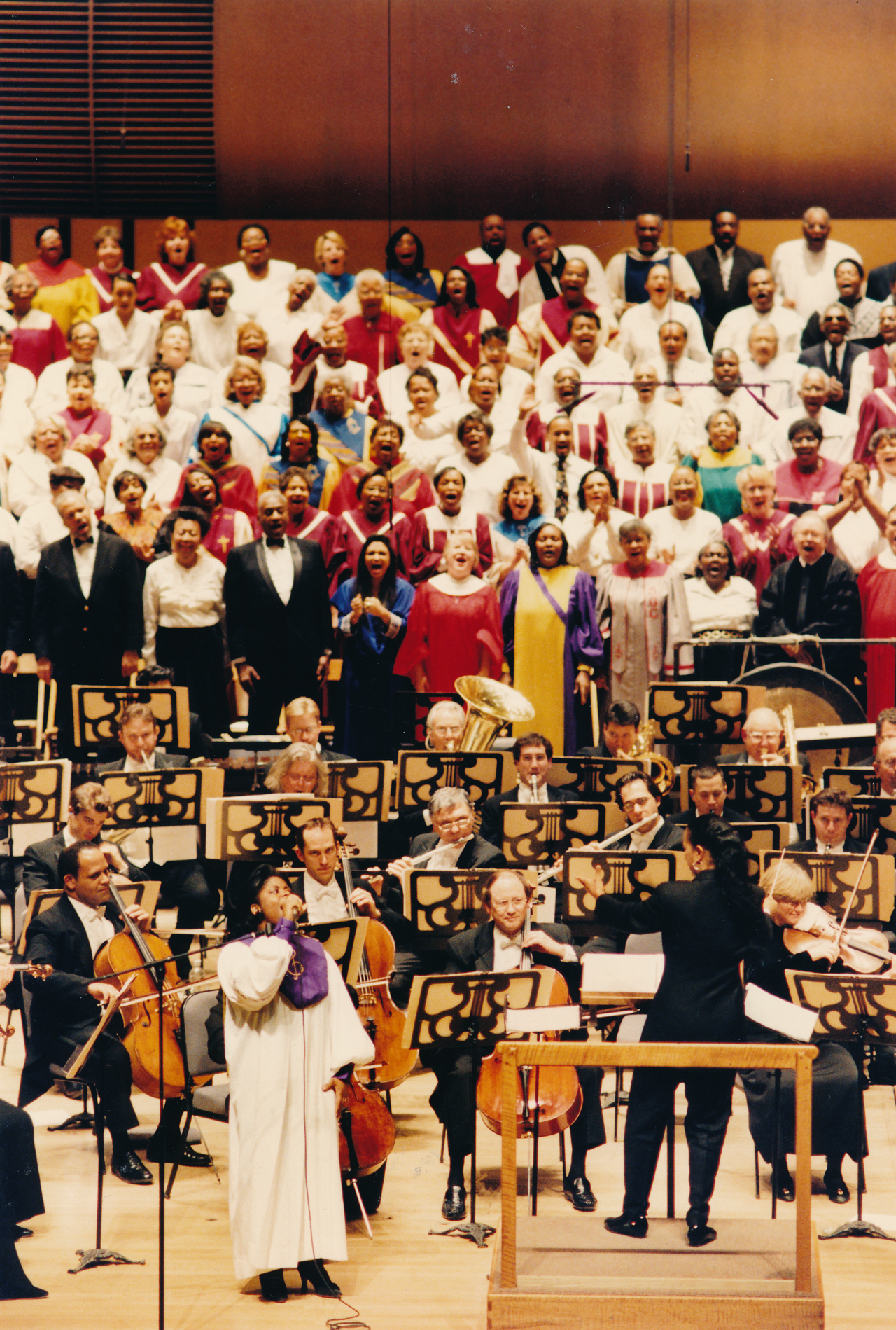
Honoring the Legacy ofDr. Martin Luther King, Jr.
Dr. Martin Luther King, Jr. (1929-1968) spoke out tirelessly against racial, social, and economic injustices as one of the key figures of the American civil rights movement in the 1950s and 60s. Dr. King preached the importance of nonviolent action and brotherhood for all humankind across the globe. However, his message of shared, peaceful prosperity was often met with resistance and violence, culminating in his assassination in 1968. Yet even after death, Dr. King’s legacy continues through acts of solidarity, words of faith and hope, and in music.
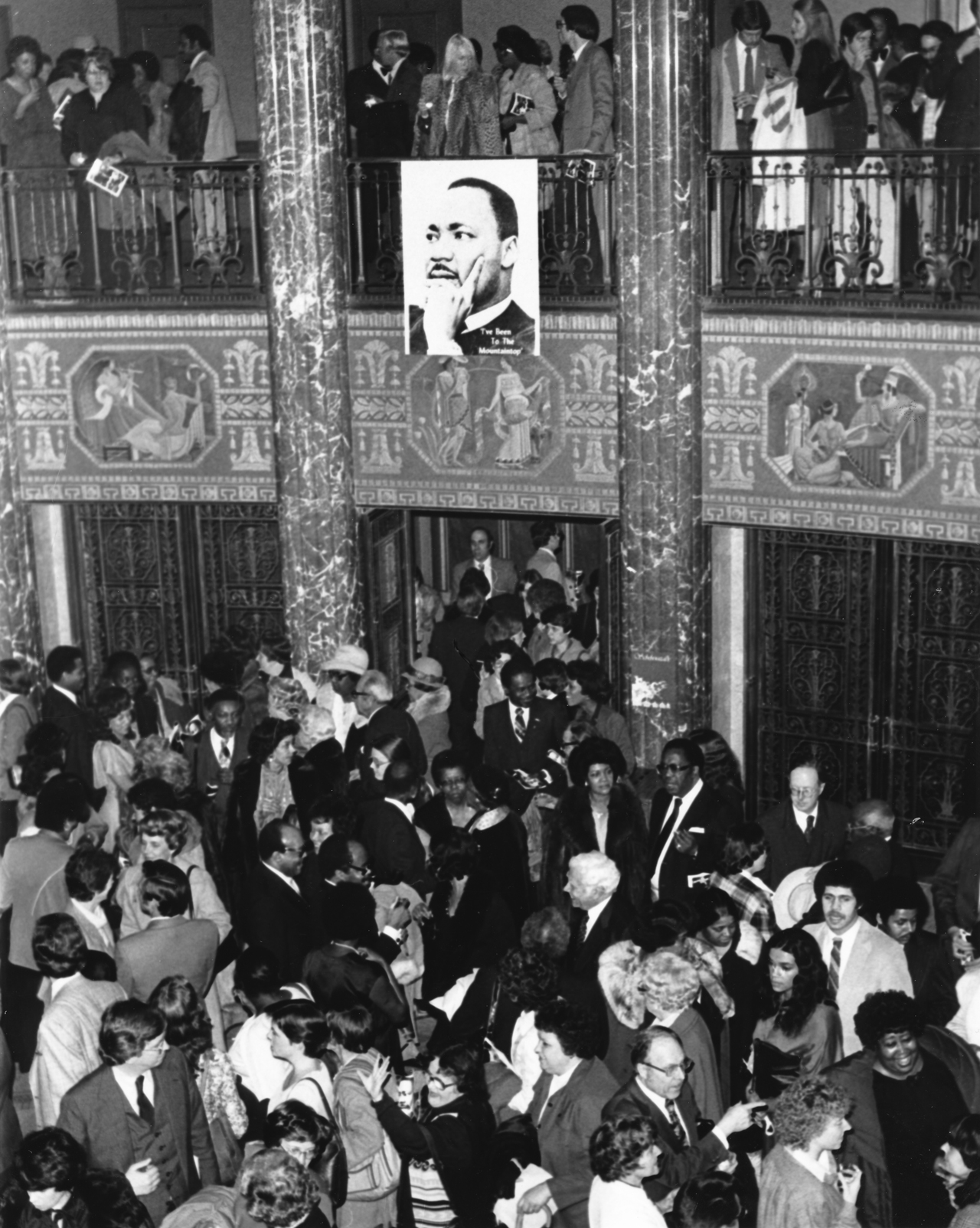
Though Dr. King was considered by some to be a controversial figure at the time of his death, The Cleveland Orchestra and its music director, George Szell recognized the power of Dr. King’s words and actions early on. On April 8, 1968, just a few days after Dr. King’s death, Szell led the Orchestra in a special performance of the Allegretto from Beethoven’s 7th Symphony, to be followed by a minute of silence in honor of Dr. King. Though Szell would pass away in 1970, a decade before consistent homages to Dr. King began, he planted an undeniable seed of support for the civil rights paragon and connection to Cleveland’s community.
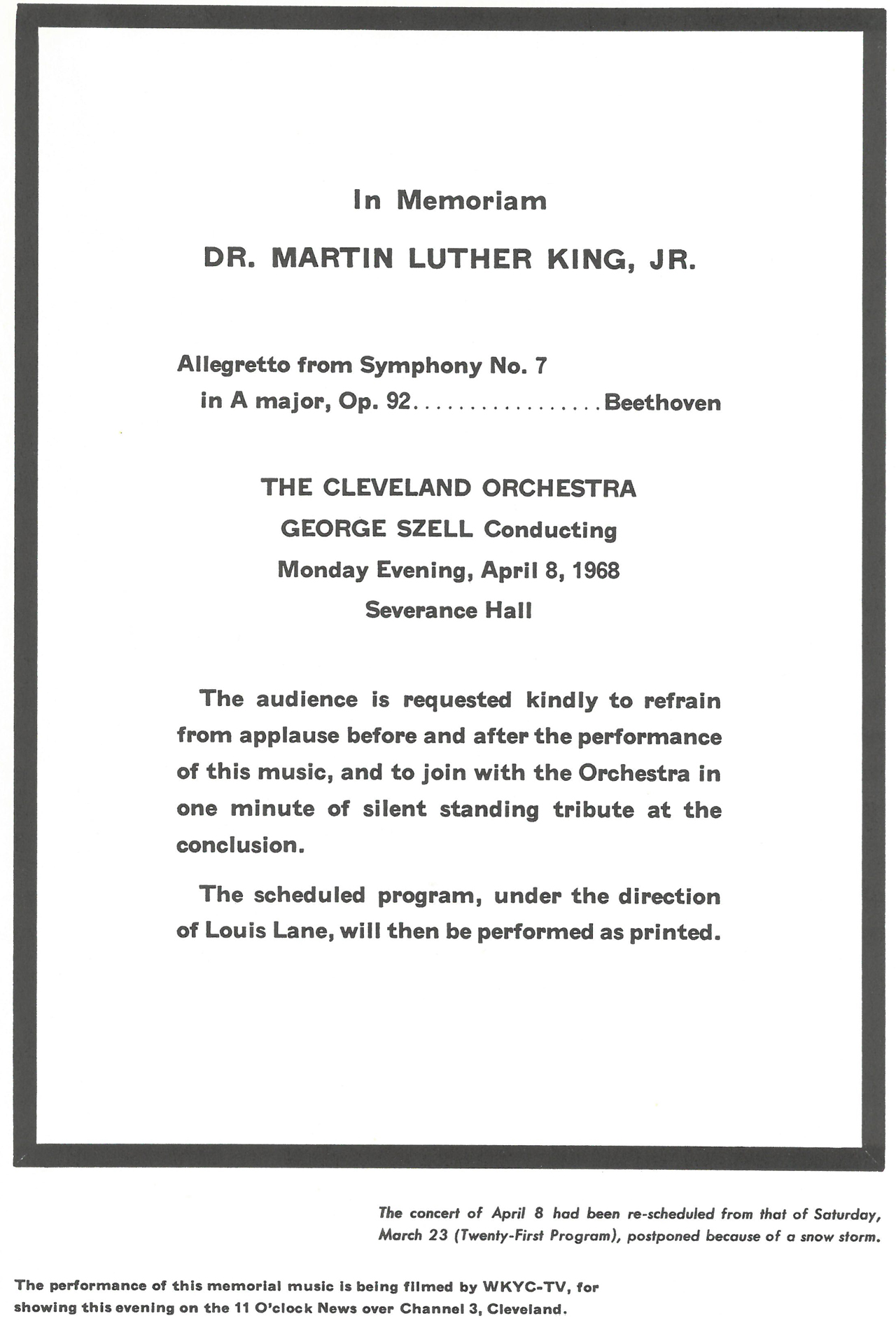
The Cleveland Orchestra consistently pursues engagements with all Cleveland residents to this day, beginning as early as 1921 with their first educational concert. The annual Dr. Martin Luther King, Jr. Celebration is one of the most popular and well-known of these free community engagement efforts. Since its first iteration in 1980, this annual celebration of the legacy of Dr. King fills Severance to capacity and features over 100 musicians of The Cleveland Orchestra and around 150 singers in the Dr. Martin Luther King, Jr. Celebration Chorus. Though these concerts initially took place at Severance, Cory United Methodist Church – the location of Dr. King’s last speech in Cleveland – held over a decade’s worth of celebrations before the year 2000. Today, these performances feature a blend of The Cleveland Orchestra and a robust volunteer choir ringing through Severance, but the format and music performed within these concerts have shifted slightly through time.
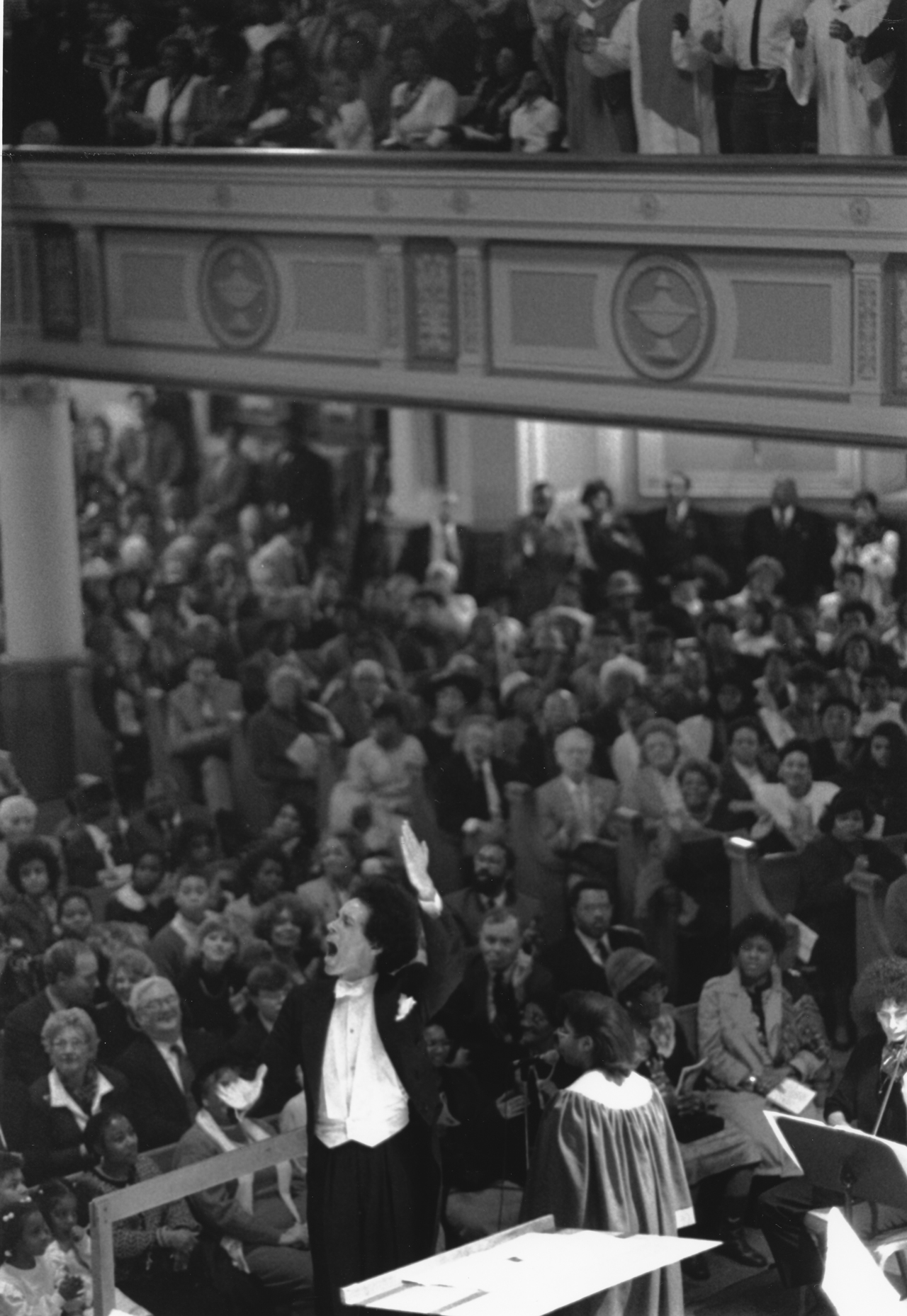
Conversations began at least as early as 1979 regarding an annual MLK celebration collaboration with the Orchestra and the Greater Cleveland Interchurch Council, even before Dr. Martin Luther King, Jr.’s birthday became dedicated as a federally acknowledged holiday in 1983. The first of these concerts took place on January 15, 1980, to a sold-out crowd with guest conductor Andrew Davis leading the Cleveland Orchestra Chorus and the Prestonian Choral Ensemble in a rendition of Beethoven’s 9th Symphony (beginning in 1987 and continuing today, tickets are free to this concert). Reportedly, the performance received a standing ovation of over three minutes; listen below for an excerpt of the rousing finale.
Over time, the vocal performances during these concerts evolved to include music outside of the classical canon: today’s celebrations are a mix of orchestral and vocal, including inspirational a cappella spirituals and gospel songs. In 1989, the volunteer choir became known as the Cleveland Community Gospel Chorus. Alvin Parris III created and directed this community choir for over a decade, which featured singers from dozens of local area churches. Alvin Parris III, a minister, music director, and organist, also showcased his compositional skills by crafting gospel suite arrangements for the concerts. The Central State University Chorus and the Cleveland Orchestra Chorus also performed at MLK celebrations throughout the years, but now the all-volunteer choir is known as the Martin Luther King, Jr. Celebration Chorus. William Henry Caldwell, a well-respected choral conductor, educator, clinician, and baritone, prepared the choruses for the first time in 2003, kicking off a long legacy of collaboration that has continued to today.
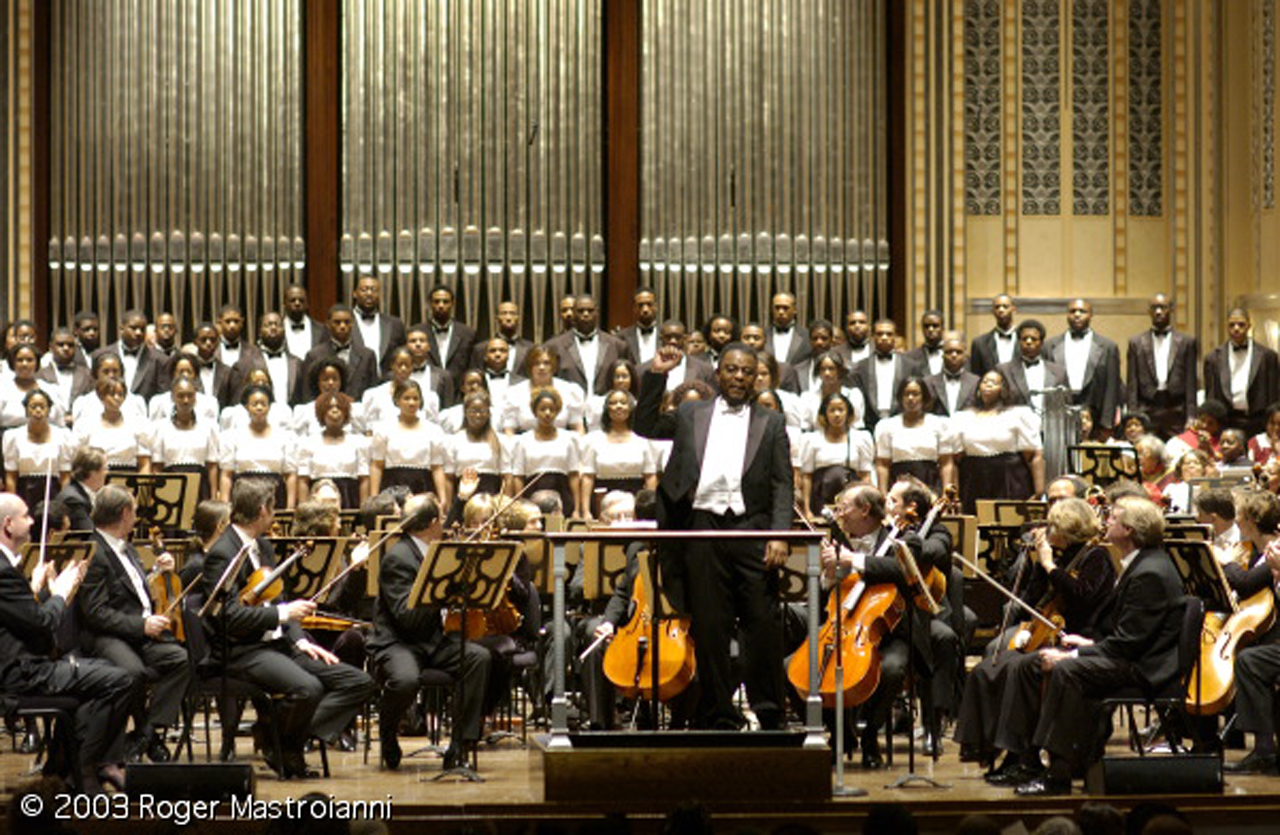
Reflecting on singing in the chorus, a vocalist from 2020 notes, “Dr. King’s dream must continue. Singing in this community chorus is a vehicle to spread, through art, the dream.” The songs Caldwell and Parris (among others) chose, beyond stirring the soul, relate to MLK in tangible ways. An audience sing-along of “Lift every voice and sing” occurred during almost all the concerts starting in 1984, a song often referred to as the Black national anthem. “We Shall Overcome” (excerpted below) became a popular staple, especially in the last 25 years of the concerts, which was sung at the March on Washington in 1963 and at Dr. King’s funeral.
Associate conductors and music directors of The Cleveland Orchestra have led the MLK concerts, as well as renowned guest conductors who treat audiences to new interpretations. The long-celebrated line of conductors includes Thomas Wilkins, current conductor of the Hollywood Bowl Orchestra; Isaiah Jackson, recently retired Professor Emeritus at Berklee College of Music and prominent guest conductor; Kay George Roberts, Professor Emerita of music at the University of Massachusetts Lowell; André Raphel Smith, distinguished guest conductor in the United States and abroad; and Chelsea Tipton II, music director of the Symphony of Southeast Texas.

In addition to powerful spirituals and gospel singing by the chorus and soloists, the MLK Concerts feature orchestral fare by composers of color. Consistent favorites of programming include Undine Smith Moore, Adolphus Hailstork, and William Grant Still, as well as vocal arrangements by Hale Smith and Moses Hogan. Sometimes these concerts include more standard classical repertoire by Haydn, Bach, and the like, especially during the period when The Cleveland Orchestra presented winners from the Sphinx Competition – a competition for young, Black or Latin American musicians – who would perform concertos and solos. Today, the concerts increasingly focus on Black creators, as with the 2022 MLK Celebration’s programming of only Black composers. Another tradition over the past fifteen years is awarding the Dr. Martin Luther King, Jr. Community Service Awards at these concerts, intended to honor those perpetuating and living Dr. King’s legacy in their communities. Dolores White, a 2022 recipient of the award, composed Celebration – Salute to the Arts for the concert, sampled below.
Each January, The Cleveland Orchestra welcomes the community to gather together when treasured musical collaborators take the stage to celebrate the life, work, and message of Dr. Martin Luther King, Jr. In 2016, local music critic Zachary Lewis noted, “More than just a ceremony or staged tribute, [the concert] was an action, a vibrant, communal living-out of the message Dr. King preached..” The Cleveland Orchestra hopes to see you there for a dynamic, musical multimedia event in this long legacy of reflection and celebration in the Cleveland community.